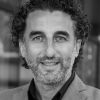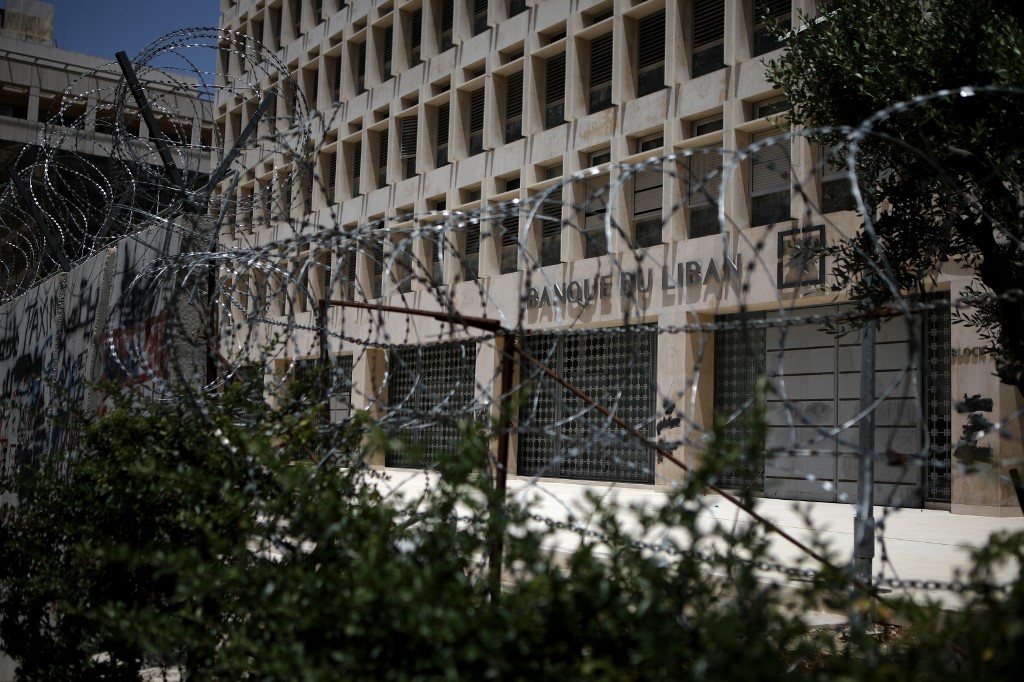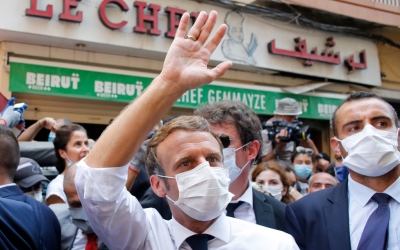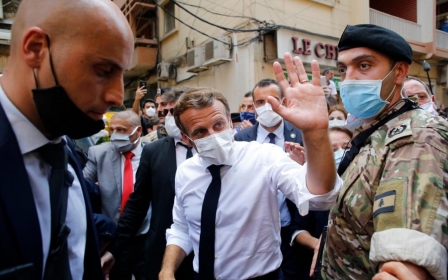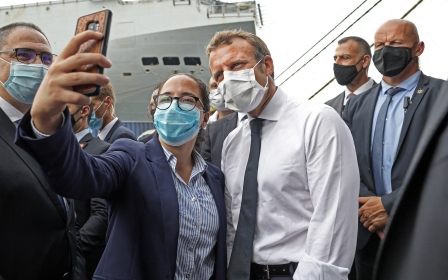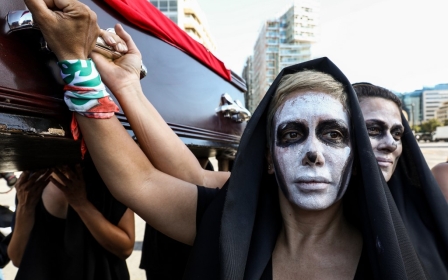Lebanon crisis: The long arm of French neocolonialism is back
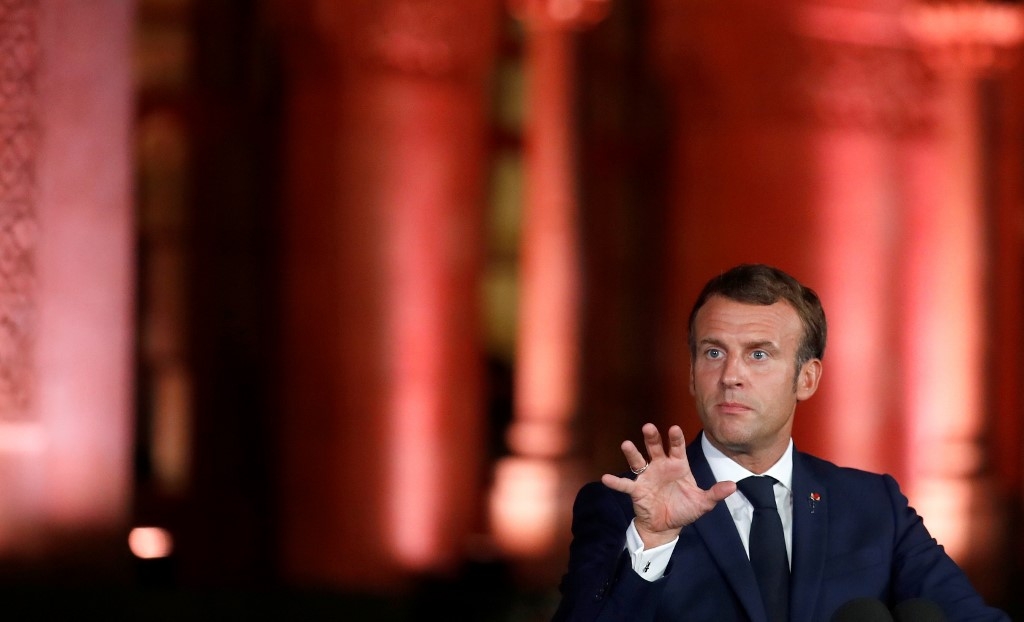
Lebanese politicians are scrambling at home and security chiefs are conferring abroad to form a new government in line with French-set deadlines. The new government is expected to embody a new political pact called for by French President Emmanuel Macron during his first visit to Beirut after the deadly port explosion on 4 August.
Macron identified humanitarian aid and government formation as his priorities. But he also pushed for policies that would presumably lift Lebanon out of its financial abyss, without which long-term recovery is near impossible.
These conferences provide an international umbrella of legitimacy for Lebanese neoliberal policies of debt and austerity
Corruption and waste by the ruling elite have been identified as the root causes of the problem. These elites are ever-so-blameworthy, but they did not act alone.
Were it not for the support of international actors, including French sponsorship of a series of “donor” conferences that refinanced the same corrupt elite Macron now seeks to reform, Lebanon’s financial mess might not have lasted as long or run as deep.
The history of French financial intervention and its contemporary role in buoying Lebanon’s oligarchy dispels wishful thinking that delegitimising local elites by seeking the direct support of their global counterparts will solve the country’s problems.
New MEE newsletter: Jerusalem Dispatch
Sign up to get the latest insights and analysis on Israel-Palestine, alongside Turkey Unpacked and other MEE newsletters
The two are intertwined. It also shows the danger of uncritically endorsing Macron’s vision of change, which is a rebranding of French-endorsed recipes of austerity.
French financial complicity is as old as Lebanon. In 1919, one year before Lebanon was declared a country by French occupying forces, the latter transformed the privately owned Imperial Ottoman Bank’s branch in Beirut into the Banque de Syrie et du Liban (BSL), which acted as both a government bank and a commercial enterprise.
The BSL tied the Syrian and Lebanese liras to the French franc at an overvalued rate favourable to French imports. Major concessions in agriculture, industry and financial services were also granted to French firms, to the detriment of local development. When financial crises hit in France, Lebanon automatically felt the tremor.
Political independence in 1943 did not end French financial control. The BSL continued to monopolise monetary policy until 1964, when Lebanon’s own central bank was founded. BSL director Henri Busson acted as the de facto financial ruler, maintaining a conservative monetary policy, undermining Syro-Lebanese economic integration, and consolidating French concessionary interests by forming a business cartel, Seriac, in cahoots with local business circles close to Lebanon’s first president, Bechara El Khoury.
Fuelled by debt
The eventual rise of US economic influence in the region weakened France’s grasp on Lebanon’s finances. But the post-civil war reconstruction phase in the 1990s, fuelled by debt, paved the way for a return of French financial intervention - this time under the auspices of international governance.
When Lebanon’s public debt became unsustainable in the early 2000s, then-French President Jacques Chirac came to the aid of his ally, then-Prime Minister Rafik Hariri. Chirac convened an international conference in Paris in 2001 (Paris I) that set the stage for additional conferences in 2002 and 2007 (Paris II and III) under Chirac, and Paris IV, or CEDRE, in 2018 under Macron.
These conferences did not lead to serious debt reduction. Quite the opposite; they generated more debt under a strict framework of fiscal adjustments.
Firstly, the vast majority of “aid” was in loans, not grants. In the case of CEDRE, more than 90 percent was in loans. Secondly, these loans often stipulated privatisation of state assets and a conservative tax policy.
A privatisation law issued in 2000 had set the stage for the process by setting up the Higher Privatisation Council, which is currently touted as the ideal instrument for selling state assets to make up for central bank losses.
Hariri also promised a “major” programme of privatisation of the telecommunications and electric power sectors, a major target of “reforms” today. He fired about 2,000 staff at the national television station and airline, and introduced a value-added tax of 10 percent, which is blind to income inequality. Hariri’s fiscal adjustment steered clear of public debt, which meant that 80 percent of government expenditures became devoted to interest payments.
Sectarian calculations
Thirdly, aid earmarked for economic development is largely directed at infrastructure, energy and transportation, with little attention to the productive sector. Lebanon is in dire need of infrastructure repair, but as the government’s capital investment programme for CEDRE shows, infrastructural projects like ports and water dams are based on sectarian calculations rather than national considerations.
Fourthly, these conferences provide an international umbrella of legitimacy for Lebanese neoliberal policies of debt and austerity; in effect, they are a vote of confidence in the governing elite.
Conference participants over the years have included a wide spectrum of countries, from the US to China to Gulf states, in addition to global financial institutions such as the International Monetary Fund (IMF), the World Bank and the European Bank for Reconstruction and Development.
These conferences were never a purely economic or financial matter. Backing these governments was an attempt to shore up Hezbollah’s adversaries after geopolitical gains by the latter. All were held during the premiership of Hariri the father, the son, or their financial mastermind, Fouad Siniora. Paris I and II took place in the aftermath of the 2000 liberation of the south, and Paris III was convened after the 2006 Israeli war on Lebanon.
In 2018, CEDRE sought to give a weakened Saad Hariri a boost under the presidency of Hezbollah’s ally, Michel Aoun. In his opening address, Macron’s foreign minister, Jean-Yves Le Drian, reiterated worn-out calls for the Lebanese state to monopolise arms, and implicitly called for Lebanese neutrality, currently peddled by Lebanon’s Maronite patriarch.
A month earlier, a conference in Rome was held to support Lebanese security institutions to undermine Hezbollah but not challenge Israel, something the US has been doing for years with little success.
Colonial deja vu
Macron’s current plans rely on CEDRE as a reference point. Privatisation remains a priority, with a focus on the electricity sector. Infrastructural projects are likely to receive more scrutiny before approval, with the reconstruction of Beirut’s port taking centre stage, but at the expense of forfeiting further control to foreign capital.
If successful, they will pave the way for more of the same recipes peddled by France and other international actors over two decades
Macron, a financial inspector by training, has also called for a forensic audit of the BDL and the imposition of capital controls. Both are necessary and much-needed steps to ensure accountability for financial mismanagement and to stem the flight of capital selectively conducted by private banks.
But in Macron’s roadmap, these measures are explicitly tied to IMF demands and conditions. In short, and if successful, they will pave the way for more of the same recipes peddled by France and other international actors over two decades. This time around, however, these international actors may circumvent incompetent and inefficient local elites and impose direct financial tutelage.
Such a colonial deja vu might offer immediate and apparent relief, but in the long run, it will spell more political collapse and economic ruin.
The views expressed in this article belong to the author and do not necessarily reflect the editorial policy of Middle East Eye.
Middle East Eye delivers independent and unrivalled coverage and analysis of the Middle East, North Africa and beyond. To learn more about republishing this content and the associated fees, please fill out this form. More about MEE can be found here.


